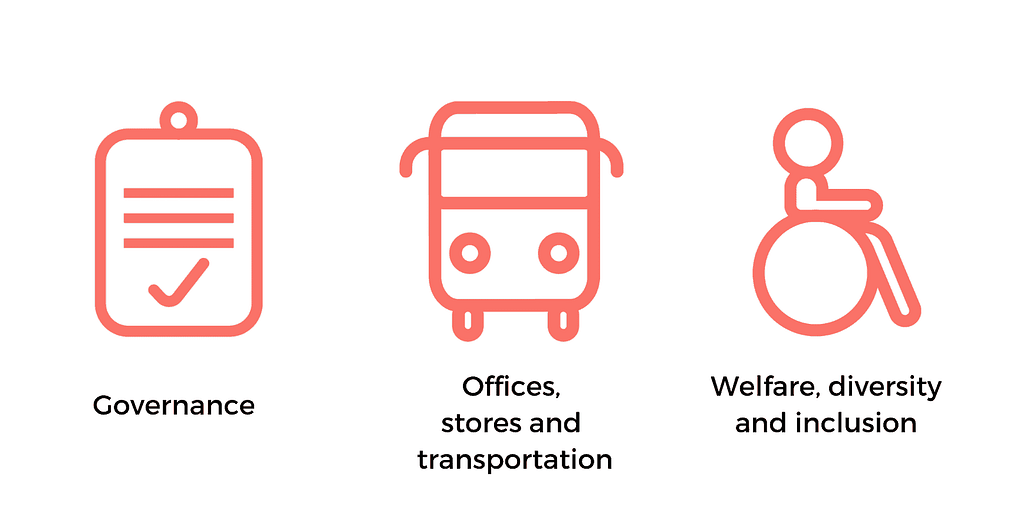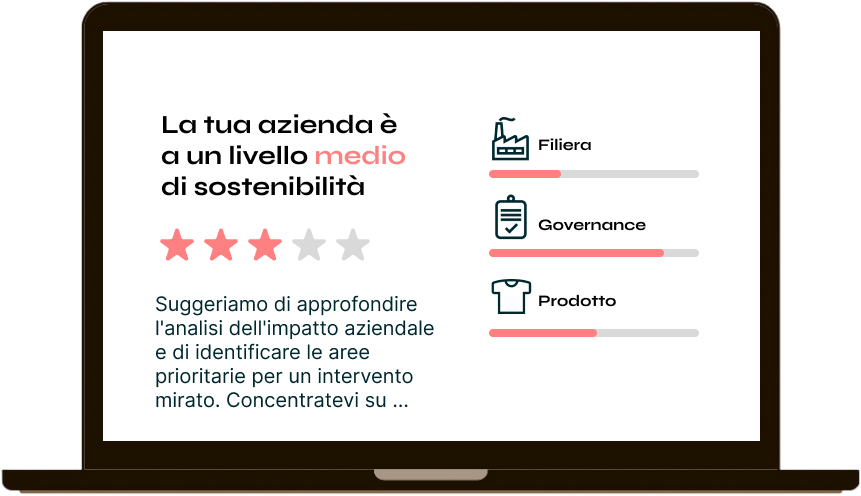Cikis Sustainability Assessment: Corporate
The Cikis Sustainability Assessment: what is it?
Sustainable development is now a priority for fashion and textile companies, one of the most polluting sectors. The total emissions of greenhouse gases from textile production, equal to 1.2 billion a year, are higher than those of all international flights and maritime transport combined. This system must change. That requires systemic effort and an unprecedented degree of commitment, as well as collaboration and innovation.
In a previous article, we talked about Cikis Sustainability Assessment and how our framework developed specifically for the fashion sector allows us to analyze the integration of sustainability practices within business processes and the supply chain. A survey conducted by Cikis in 2020, showed that 41.5% of Italian SMEs do not have skills regarding sustainability. At once, 19.5% have never raised the problem.
The Cikis Sustainability Assessment is divided into three macro-categories. This framework maps the critical issues and strengths of the company as a whole, immediately identifying actionable points to be implemented in the strategy. In particular, for each area analyzed within the macro-categories, a benchmark is made comparing to the main industry standards.
Today we analyze the Corporate macro-category, which indicates the level of sustainability of corporate operations. In the fashion industry such internal operations carry lower environmental and social risks than the supply chain or production processes. However, monitoring them is essential as they are under the direct control of companies. This section consists of three areas:

Cikis Sustainability Assessment: Governance
Governance is of particular importance: if well structured, it allows for effective integration of sustainability into the corporate strategy. Defining responsibilities, rules, and decision-making mechanisms as well as the structure adopted to define the objectives and the means to achieve and measure them, is fundamental for the success of a company. So it is to ensure that it operates ethically. When it comes to sustainability, we recommend combining the top-down and bottom-up approaches. Sustainability should hence be a responsibility of a company’s highest levels which at the same time should involve the employees.
Cikis Sustainability Assessment: Offices, stores and transportation
Emissions related to internal operations generally have significantly reduced impacts than those of the supply chain and production processes. However – as one of the elements on which the company has direct control – they often are the first touchpoint of sustainability reports. The sustainability of offices and stores often goes hand in hand with efficiency and consumption reduction and is also closely linked to cost optimization.
Cikis Sustainability Assessment: Welfare, diversity and inclusion
Although social risks in the fashion sector are mainly present along the supply chain, employee well-being remains an obvious priority for every company, also linked to performance: according to the Welfare Index PMI 2019, the most active companies in welfare have observed positive effects on labor productivity in 63.9% of cases, against an average of 36.4%, and on corporate image and reputation in 72.5% of cases, against an average of 42.4%. The well-being of workers is also closely linked to diversity and inclusion, where Italian companies have on average ample room for improvement: the World Economic Forum‘s Global Gender Gap Report sees us at 76 out of 153 countries.
The Cikis Sustainability Assessment: beyond the Corporate operations
In addition to the Corporate elements, our framework analyzes the Products and Processes and Supply Chain macro-categories. They are respectively linked to the level of sustainability of the collections and that of the suppliers and to the degree of traceability beyond direct suppliers.
A complete and material analysis is the first step to define an effective sustainability strategy capable of integrating company priorities. In fact, in this phase, the main areas of action emerge, from which to start to outline the operational implementation project and an adequate communication strategy. Choosing Cikis means having practical support in selecting materials and suppliers, in the testing of chemical processes, in the development of circular economy projects, and in communicating the path taken.
Want to find out your company’s strengths and soft spots regarding the sustainability of corporate operations?
Get articles like this and the latest updates on sustainable fashion automatically!
